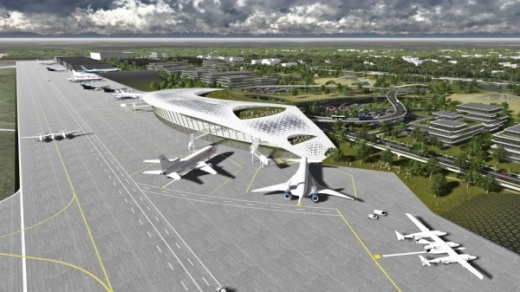By the end of 2020, officials said Phase 1 of the spaceport will be filled with roads, water pipes and electrical lines; a major tenant in the middle of construction; and students learning about the future of aerospace.
Crews are in the process of developing Phase 1 of the spaceport, which exists as hundreds of acres of open land in the southern part of Ellington Airport, which includes private hangers and military presence.
Phase 1, which costs $18.8 million, includes 3 miles of roads and other infrastructure city officials will use to entice aerospace companies to locate in the spaceport, Ellington Airport General Manager Arturo Machuca said.
“It’s about creating the neighborhood, the foundation to allow for companies to come here and do their business,” Machuca said.
The spaceport has one tenant: Intuitive Machines is set up in the Houston Aerospace Support Center on the spaceport’s east side. The local business is developing a lunar lander that will fly to the moon in 2021.
Additionally, the first tenant outside the support center to benefit from Phase 1 development is on its way.
FlightSafety International Inc., which develops simulators for pilots to test and practice flying, in the spring will break ground on a more than 100,000-square-foot development in Phase 1 of the spaceport. Construction will take 10 months, Machuca said.
Local colleges are also working with aerospace industry leaders to develop curriculum to train the next iteration of aerospace manufacturers.
San Jacinto College helped create the Edge Center within the Houston Aerospace Support Center. The Edge Center will be used to educate and train college students who are interested in getting into the aerospace field, said Sarah “Sallie Kay” Janes, San Jacinto College’s associate vice chancellor for continuing and professional development.
With curriculum now officially in place, classes will begin Jan. 20. Classes will be small to start with most work being done online, but they will grow as interest increases, she said.
With so much in the works, officials said they are excited about the future of the spaceport and the potential it has to positively affect the regional economy.
“We’re positioning the Houston region to become a solid player in this new industry,” Machuca said. “It’s nothing but good news.”






